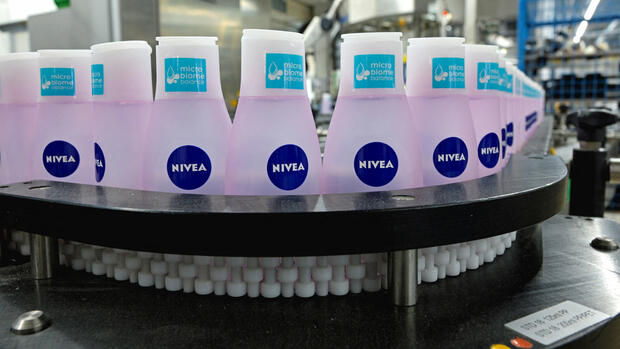Manufacturer Beiersdorf started the year better than expected.
(Photo: Reuters)
Dusseldorf The consumer goods manufacturer Beiersdorf achieved higher revenues in the first quarter than expected on the market. Group sales increased organically by 12.2 percent to EUR 2.48 billion in the past three months. The Nivea manufacturer announced this on Wednesday.
The company also raised its guidance and now expects full-year organic sales growth to be “in the mid- to high-single digits.” So far, there has been talk of a mid-single-digit range.
Consumer goods manufacturers like Beiersdorf are actually currently struggling with adverse circumstances. In view of the inflation, customers are buying only cautiously. At the same time, companies have high expenses for energy, freight and raw materials. Beiersdorf, for example, accounted for 20 percent additional costs in the past year.
Beiersdorf was able to raise prices and increase sales volumes
Still, in 2022, the company managed to increase its profits. Before interest and taxes (EBIT) excluding special effects, this rose by 17 percent to 1.16 billion euros. Competitors such as Henkel (Persil, Pril) and Unilever (Axe, Dove) had recently reported declining surpluses.
Beiersdorf managed to push through higher prices in retail. Unlike many competitors, the Dax group also managed to increase the quantity sold despite the price increases. For the first time in two decades, the group reported double-digit organic sales growth in 2022.
Management’s new strategy seems to be paying off. With its core brand Nivea, which accounts for the bulk of sales, the group is concentrating on fewer but higher-margin products such as face care creams. This area is considered a growth market in the cosmetics industry.
The trend reversal at the Nivea manufacturer was successful under the French.
(Photo: Reuters)
At the same time, Beiersdorf no longer focuses outside of Germany on segments such as hair care, where competitors dominate the market. The group also wants to close geographic gaps and is expanding to China and Indonesia, for example.
“In Asia, many people get up earlier to care for their face – with up to nine different products. We are not yet active in this area in Asia. We will change that,” announced CEO Vincent Warnery in an interview with the Handelsblatt in autumn.
Trend reversal at the Nivea manufacturer
The Frenchman has been the boss of Beiersdorf for almost two years. Initially, he largely implemented the strategy of his predecessor, Stefan de Loecker. He had left the company in the spring of 2021 because, according to reports, there was a dispute with the owners. The Herz family owns a large part of the shares via Maxinvest Holding.
The recent increase in sales underscores a trend reversal. In the past decade, Beiersdorf has not grown noticeably in terms of profits or sales. This caused unrest, almost the entire top management was replaced. Beiersdorf has been relegated from the Dax several times, and since the summer of 2022 the paper has been part of the first stock exchange league again.
In the current year, the Beiersdorf share has increased by 13 percent, slightly outperforming the Dax. On Wednesday afternoon, the share was up around 1.2 percent at 122 euros.
Beiersdorf invites its shareholders to the virtual Annual General Meeting next Thursday. They complain that the group only wants to pay a dividend of 70 cents per share despite increasing profits and sales. CEO Warnery recently asserted that he wanted to tackle the issue.
More: Beiersdorf shares will rise more strongly in 2022 than any other in the Dax – is it worth getting started now?
